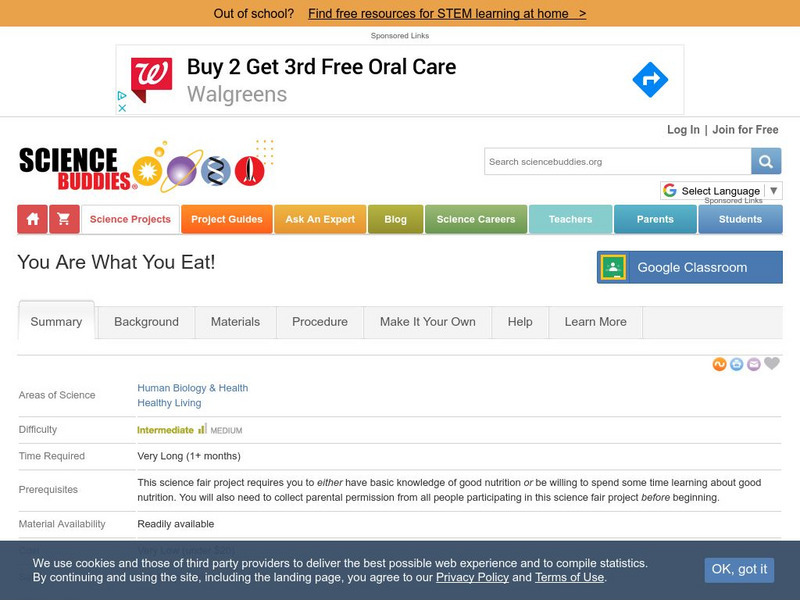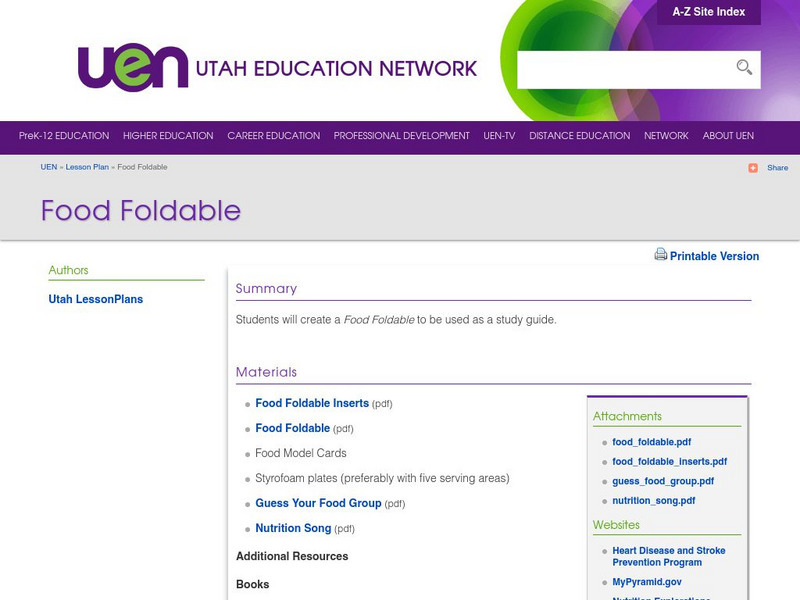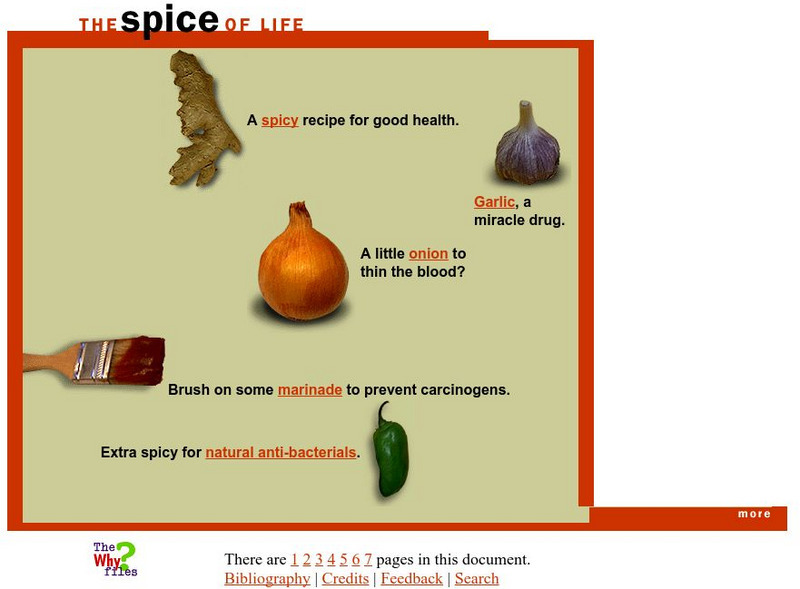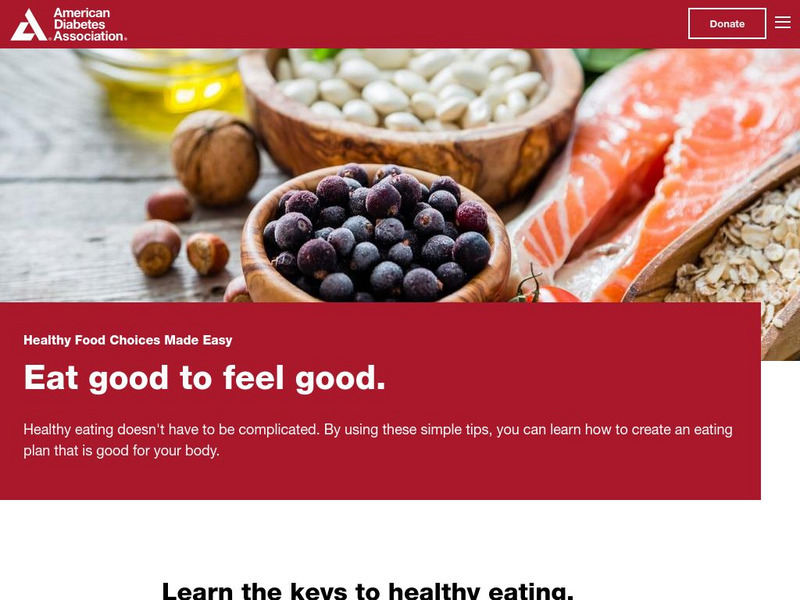Curated OER
Kids Health: What Do Food Labels Really Say?
An overview of food labeling history and importance, how to read food labels, basic components of a food label, and a comparison of different foods.
Curated OER
Kids Health: Kids and Exercise
Information about kids and exercise. Includes an age-appropriate guide to the type and the amount of daily exercise children should be getting.
Curated OER
Kids Health: Kids and Exercise
Information about kids and exercise. Includes an age-appropriate guide to the type and the amount of daily exercise children should be getting.
Aetna Intelihealth
Aetna: Inteli Health: High Cholesterol
Thorough overview of high cholesterol. Includes information on symptoms, diagnosis, prevention, and much more.
Science Buddies
Science Buddies: You Are What You Eat!
Thinking about improving your sports performance? Want to help friends and family make the most of their physical fitness activities? One factor to consider is food. Whether you realize it or not, what you eat does change your body. It...
Utah Education Network
Uen: Food Foldable
During this lesson, students will listen to a poem about a balanced diet and create a foldable. In each section of the foldable, students will include information about a different food group and will use this creation as a study guide.
American Cancer Society
American Cancer Society: Stay Healthy
This large site from the American Cancer Society offers comprehensive information on many kinds of cancer. From the left navigation bar, click to Prevention, Early Detection, Nutrition and Prevention, or Environmental Risks.
University of Wisconsin
The Why Files: The Spice of Life
Spice up your life! Adding spice to your meals has been linked to many beneficial health results. Explore what the Why Files have discovered.
Other
American Diabetes Association: Food and Fitness: What Can I Eat: Eating Out
Learn to make low fat, low sugar, and low sodium food choices, even when eating out. This guide serves as a helpful tool not only for diabetics who need to control their blood glucose levels, but for anyone seeking to eat healthfully,...
Other
Mississippi Public Broadcasting: Ed Said
Meet Ed Said, a nine-year-old purple-haired hard-core fruit-and-veggie rapper. Learn nutrition facts from Ed by watching and playing his videos and songs. Includes many print-and-color activities about eating healthy fruit- and...
PBS
Pbs Learning Media: Lesson 1: Where Are the Soda Trees?
Using film clips from In Defense of Food and a team activity, students explore healthy eating habits. Students get excited about becoming food defenders and begin learning how to differentiate between food (whole and minimally processed)...
PBS
Pbs Learning Media: Curriculum Introduction: In Defense of Food
This section includes an overview of the curriculum, ideas for how to get started, and snapshots of the curriculum's key features. The "How to use this curriculum" section helps educators see how lessons are structured to be clear and...
PBS
Pbs Learning Media: Lesson 10: Eat Food. Not Too Much. Mostly Plants.
In this final lesson a clip from In Defense of Food shows students the vibrant food movement that is springing up across the country. In a final celebration, students share their final projects with the class and think about how they can...
PBS
Pbs Learning Media: Lesson 9: Lettuce Turnip the Beet
In this lesson learners explore plant-based foods enjoyed by their own and other families and cultures and how to face challenges to healthy eating.
PBS
Pbs Learning Media: Curriculum Family Sheets (Espanol)
This is a compilation of all of the take home Family Sheets from Lessons 1-10 in Spanish. These help students bring messages learned in the In Defense of Food Curriculum back to their Spanish speaking families.
National Institutes of Health
Nih: Aim for a Health Weight
This brief but informative site discusses the role of body mass index and waist circumference in determining your risk of disease and death.
Utah Education Network
Uen: Healthy and Unhealthy Behaviors
This lesson teaches students to identify the differences between healthy and unhealthy behaviors. Included are graphic cards that the students will use to make a classroom chart of healthy and unhealthy behaviors.
TED Talks
Ted: Ted Ed: Gary Wolf: The Quantified Self
Gary Wolf discusses how we use modern technology, more specifically gadgets and apps, to monitor our health and body. [5:11]
PBS
Pbs: Scientific American Frontiers: Teaching Gude: Healthy Choices
Through this activity, high school students keep track of what they eat everyday and compare their nutrient intake with the minimum requirements for good health.
Mayo Clinic
Mayo Clinic: Heart Healthy Foods
Resource provides great information on the topic of heart healthy foods. The site is fairly in-depth with links scattered throughout for additional information on related subjects.
US Department of Agriculture
Vegetarians Can Get Enough Zinc and Other Minerals From Food Alone
Discusses research study which showed that a group of women on a vegetarian diet which included eggs and milk absorbed enough zinc and iron to maintain good health.
National Institutes of Health
Niddk: Safe and Successful Weight Loss Program
Put up by the National Institute of Diabetes & Digestive & kidney Diseases, this site offers guidelines to help you choose a safe, effective, and long-range weight control program.
CK-12 Foundation
Ck 12: Life Science: Choosing Healthy Foods
[Free Registration/Login may be required to access all resource tools.] Foods such as whole grain breads, fresh fruits, and fish provide nutrients you need for good health. But different foods give you different types of nutrients. You...
Other
Grain Chain: Welcome to Grain Chain
A comprehensive website with activities for all age groups to help in understanding how grains are grown and why they are such an important part of our diet. Included are interactive games, activity sheets, and lesson plans.


















